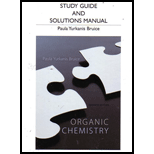
(a)
Interpretation:
Given species has to be rank from best nucleophile to the poorest nucleophile.
Concept Introduction:
Aprotic solvent are polar solvent molecules which do not have hydrogen bonded to oxygen to nitrogen.
Protic solvent are polar solvent molecules which have hydrogen bonded to oxygen to nitrogen.
The stronger base is always a better nucleophile in an aprotic solvent. When the negatively charged species is placed in aprotic solvent, the solvent molecules arrange themselves with their partially positively charged hydrogens pointing towards the negatively charged species. The interaction between the ion and the dipole of the protic solvent is called an ion-dipole interaction
(b)
Interpretation:
Given species has to be rank from best nucleophile to the poorest nucleophile.
Concept Introduction:
Aprotic solvent are polar solvent molecules which do not have hydrogen bonded to oxygen to nitrogen.
The stronger base is always a better nucleophile in an aprotic solvent.
(c)
Interpretation:
Given species has to be rank from best nucleophile to the poorest nucleophile.
Concept Introduction:
Aprotic solvent are polar solvent molecules which do not have hydrogen bonded to oxygen to nitrogen.
Protic solvent are polar solvent molecules which have hydrogen bonded to oxygen to nitrogen
The stronger base is always a better nucleophile in an aprotic solvent. When the negatively charged species is placed in aprotic solvent, the solvent molecules arrange themselves with their partially positively charged hydrogens pointing towards the negatively charged species. The interaction between the ion and the dipole of the protic solvent is called an ion-dipole interaction
(d)
Interpretation:
Given species has to be rank from best nucleophile to the poorest nucleophile.
Concept Introduction:
Aprotic solvent are polar solvent molecules which do not have hydrogen bonded to oxygen to nitrogen.
Protic solvent are polar solvent molecules which do have hydrogen bonded to oxygen to nitrogen
The stronger base is always a better nucleophile in an aprotic solvent.
When the negatively charged species is placed in aprotic solvent, the solvent molecules arrange themselves with their partially positively charged hydrogens pointing towards the negatively charged species. The interaction between the ion and the dipole of the protic solvent is called an ion-dipole interaction.
Want to see the full answer?
Check out a sample textbook solution
Chapter 9 Solutions
Organic Chemistry
- Rank the following species from best nucleophile to poorest nucleophile in an aqueous solution:arrow_forwardRank the nucleophiles in each group in order of increasing nucleophilicity. a.−OH, −NH2, H2O b.−OH, Br−, F− (polar aprotic solvent) c.H2O, −OH, CH3CO2−arrow_forwardWhich nucleophile in each pair is more reactive?arrow_forward
- Would you say its sn1 ir sn2, I said it was sn1,because the nucleophile is weak, but my teachers said it was sn2arrow_forwardIdentify the stronger nucleophile in each pair of anions.a. Br- or Cl- in a polar protic solventb. HO- or Cl- in a polar aprotic solventc. HS- or F- in a polar protic solventarrow_forwardCircle any nucleophiles that will rapidly undergo an SN2 reaction with EtBr.Rank these molecules from most acidic (1) to least acidic (5)...arrow_forward
- Identify the stronger nucleophile in each pair of anions. a.Br− or Cl− in a polar protic solvent b.HO− or Cl− in a polar aprotic solvent c.HS− or F− in a polar protic solventarrow_forwardI don’t get how to get the last one. I don’t use too many complicated reagents. But I have no idea how to do this. (B) onlyarrow_forwardFrom each pair, select the stronger nucleophile. Q.) CH3OCH3 or CH3SCH3arrow_forward
- A. Write appropriate reagents over the reaction arrow B. As a result of this reaction, is the N made more nucleophilic or less nucleophilic?arrow_forwardAlkyl diazonium salts (shown below) are considered "super" leaving groups; a consequence of this is that they tend to be contact explosives What quailities make alkyl diazonium salts such excellent leaving groups?arrow_forwardWhat is the strongest nucleophile, NH3, CH4, CH3O-, or H2O?arrow_forward
 Organic Chemistry: A Guided InquiryChemistryISBN:9780618974122Author:Andrei StraumanisPublisher:Cengage Learning
Organic Chemistry: A Guided InquiryChemistryISBN:9780618974122Author:Andrei StraumanisPublisher:Cengage Learning EBK A SMALL SCALE APPROACH TO ORGANIC LChemistryISBN:9781305446021Author:LampmanPublisher:CENGAGE LEARNING - CONSIGNMENT
EBK A SMALL SCALE APPROACH TO ORGANIC LChemistryISBN:9781305446021Author:LampmanPublisher:CENGAGE LEARNING - CONSIGNMENT

